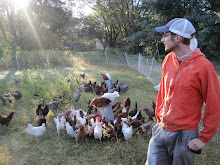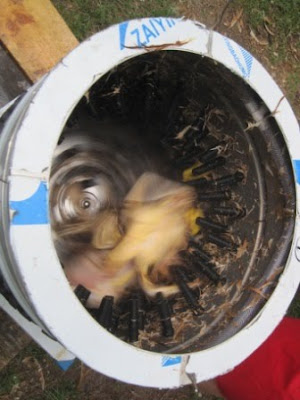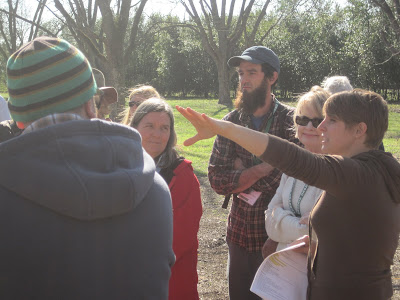You're reading this because somewhere along the way you became part of the story of Hope Grows. Maybe you helped us process chickens. Maybe you ate our bacon. Maybe you're a farmer we called for advice. Maybe you wrote about us in the newspaper. Maybe you made a documentary about hot, young Georgia farmers. Maybe you came to one of our workshops or listened to one of our presentations. Maybe you've read the blog or are our Facebook friend or watched one of our zany videos. Maybe we ate dinner together. Maybe your children insist on our eggs. Maybe you're a CSA member. Maybe you're our Mom (and in that case, God Bless you!). As Thanksgiving arrives this year I find myself straddling two important chapters in my life. I'm writing you to express with deep gratitude that Hope Grows is one of the greatest stories I have to tell. I also want you to know there is further to go, and that your presence will be required for writing the next chapter.
Hope Grows wasn't just a name we thought was cute. I remember the days we spent tossing out ideas while washing eggs, hanging up laundry, making breakfast. "Eat This…Farm" was too blunt, but a popular option. We were weeding an onion bed when the name came, our hands in the dirt. Hope Grows was not just our brand. It was our triumphant refrain to the world. It was how we saw ourselves and our little pasture-based operation in it. It was a seed just beginning to sprout, a whisper of change. Farming was not an arbitrary decision for us. It was a lifestyle chosen out of desire to live by our own hands. We were children of the city. We grew up like most folks with convenience foods, TV commercials, and strip malls, but decided to say "No, thank you" and try something else. Today I'm thankful for the bravery of that decision. It has made real human beings out of us, with real guts and real gusto.
Our exuberance for a road less traveled (at least initially) was met with confusion and doubt--from our parents, our friends, our neighbors, our former employers--but it did not keep us from working hard for ideas that, above all, simply felt good to practice in a world gone mad. We spent our days trusting in the integrity of natural design, building raised garden beds without tractors, piecing together bits of tin and recycled wood with zip ties and duct tape to do more with less, skills taught to us by far-off mentors (thank you internet!). We just went with it, did the best we could with what we had. And then, on Saturdays (and sometimes in between) there you were, a support train, a life-line, saying thank you with grocery bags eagerly waiting to be filled with our products. As we are seeing with the Occupy movement, money and where it goes is a measure of power. Thank you for empowering a couple of kids in your neighborhood. Your trust and loyalty made us the youngest self-employed, full-time farmers in the region by over 25 years--no small feat when the average age of a farmer in Georgia is 58. Your dollars have given us faith in a system of alternative investment, have helped us to believe that people can and will value not only themselves but the future. Today I'm thankful we were able to make that connection, to shake hands with real people who valued our efforts not just with lip service but with dollars. Your support drowned out the doubt (made it marginal, even), and made us feel at Home. Big "H" home--perfectly needed, necessary, wanted. I urge you to continue putting your money where your mouth (and your heart) is--Hope Grows because of you.
We paid it forward by teaching what we knew, and by sharing what we we were learning just as we learned it. In our handful of years hundreds of students visited the farm, listened to our unconventional ramblings, and got their hands a little dirty. Some for a few hours. Some for a few months. Yes, we taught the practical, technical bits like how to pasture-raise chickens or track your farm expenses, but really it was more than that: How to have unstoppable confidence when you need it and utter humility when you don't. How to trust in Mother Nature--she is always smarter than you. How to ask for help. How to be present. How to be zen in August without air conditioning, in February without heat. How to see the problem as the solution. How to honor the farm, your gut, and the great web of life at breakfast, lunch and dinner. How to challenge an institutionalized mind, especially your own. How to find work you can wrap your hands around in the world. How to approach constant work slowly and in small amounts for the greatest effect. How to develop a liberal attitude toward grass growth. How to be the kind of person you'd like to see more of in the world--even though it may be challenging or downright terrifying at times. Today I'm thankful our farm wasn't just a farm. It was a the start of a conversation, a place for raising questions, for making an example (mistakes included) for the growth of ourselves and others.
A farmer is--if she is any good--a community organizer. She's a connection-maker, an enabler. She creates effective ecological relationships, including human relationships. She understands the benefits of chickens overwintering in the blueberry patch just as well as the benefits of connecting thoughtful eaters with her pork chops. The health and sustainability of any system depends on the number of connections she can create. These connections ensure diversity, which keeps her buoyant in stormy weather. After three years running, we are moving on with a healthy network. Today I am thankful for the eaters, fellow farmers, entrepreneurs, activists, chefs, educators, and just plain friends who are a part of our network, excitedly looking forward to the next chapter. You made us feel that what we were doing in the world was part of what the world needed. You supported us even though we were unconventional, quirky, a bit rogue even. You liked our edge. We stole your hearts. The meat and eggs were good too, weren't they? I have enjoyed being strengthened by you, and look forward to repaying the favor in the journey ahead. Let's keep making connections.
And you, Elliott--how could I forget? You have taught me about working partnerships, and just how much two highly motivated kids with something to prove can really accomplish. You have been my best friend, my worst enemy, and the perennial comic relief in this adventure. I wish you much luck in the transition to a New England farm-based existence (To Be Determined). The South will graciously reaccept you with open arms whenever you need respite from the bitter cold and Yankee attitudes. Today I am thankful you were the first one to show, and the last one to leave. You have taught me much in the way of dedication and friendship.
Hope Grows laid the groundwork. It was an incubator, an epic educational experience. We're not leaving for lack of success. We're leaving because it's time to go further. Words like "community" and "alternative" and "possibility" don't quite capture what we've been practicing. At the risk of sounding like a hoodoo-voodoo-hippie-dippie (though if you're still reading this you probably don't care), "magic" seems like the most appropriate term for describing the adventure we've been on--walking together, learning together, eating together has been nothing short of profound, magical work. The lessons learned from this era will be carried over, recycled into the next, priming us for even greater success. The Universe has Spoken: Anything is Possible.
Many of you have asked what the next step is for me, where it is, what it looks like. I must apologize, this is only a teaser: Hope Grows into The Revival. Soon we'll be gathering adventurous eaters, thoughtful investors, successful designers, locally rooted, holistically minded, sensually enthusiastic people to build the infrastructure necessary to support likeminded farmers and eaters. The Revival, my friends, is what I hope you stay tuned for. I'm hoping you become part of the gospel choir for the Southern Neo-Agrarian movement--its farmers and its culture. In the words of Rebecca Thistlewaite, "We cannot be casual about the food system we want to see." Today I'm thankful you've trusted your gut and in doing so have trusted me--you haven't been casual. If I could I'd reach through the computer screen, look you in the eye, shake your hand and say thank you. You'd be able to see I really mean it.
We'll talk more soon. Happy Turkey Day!
All the Best,
Hope Grows Farm
Arianne (and Elliott)




















































